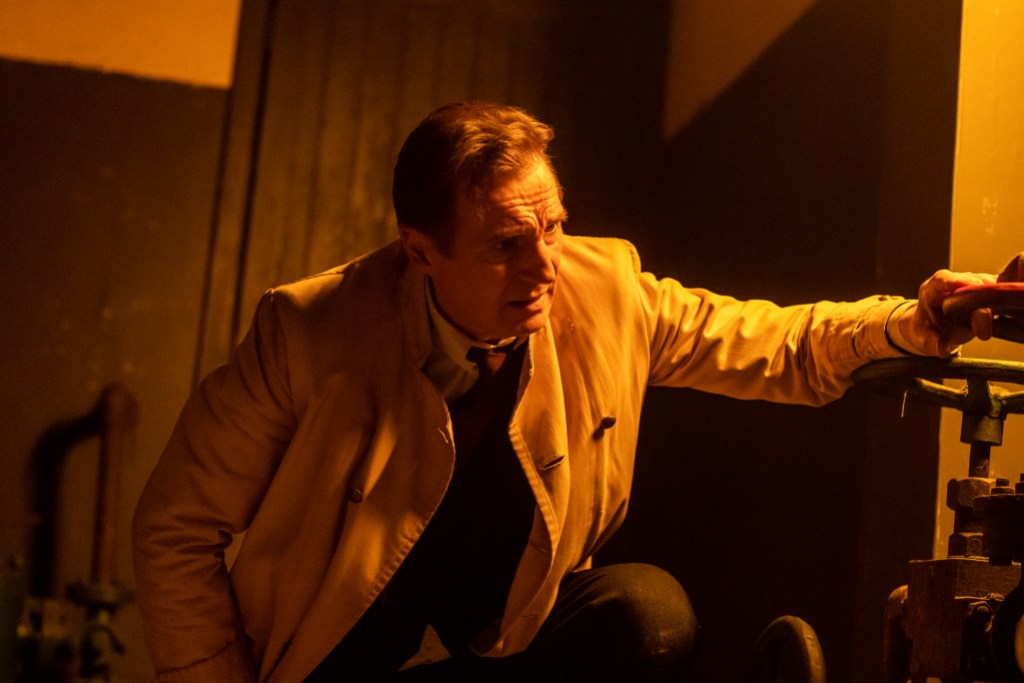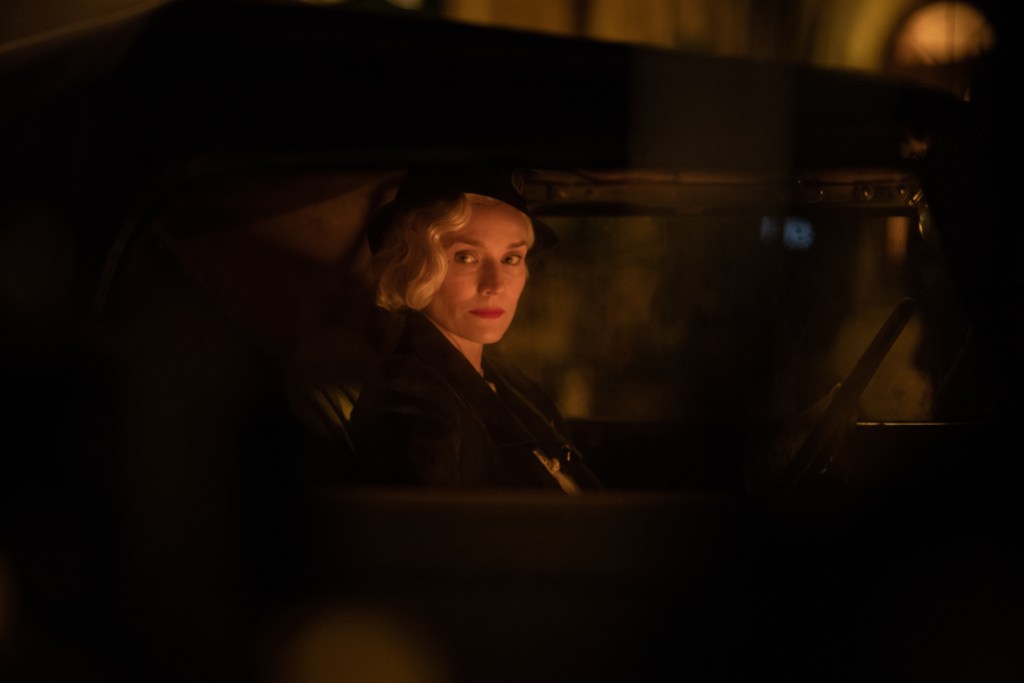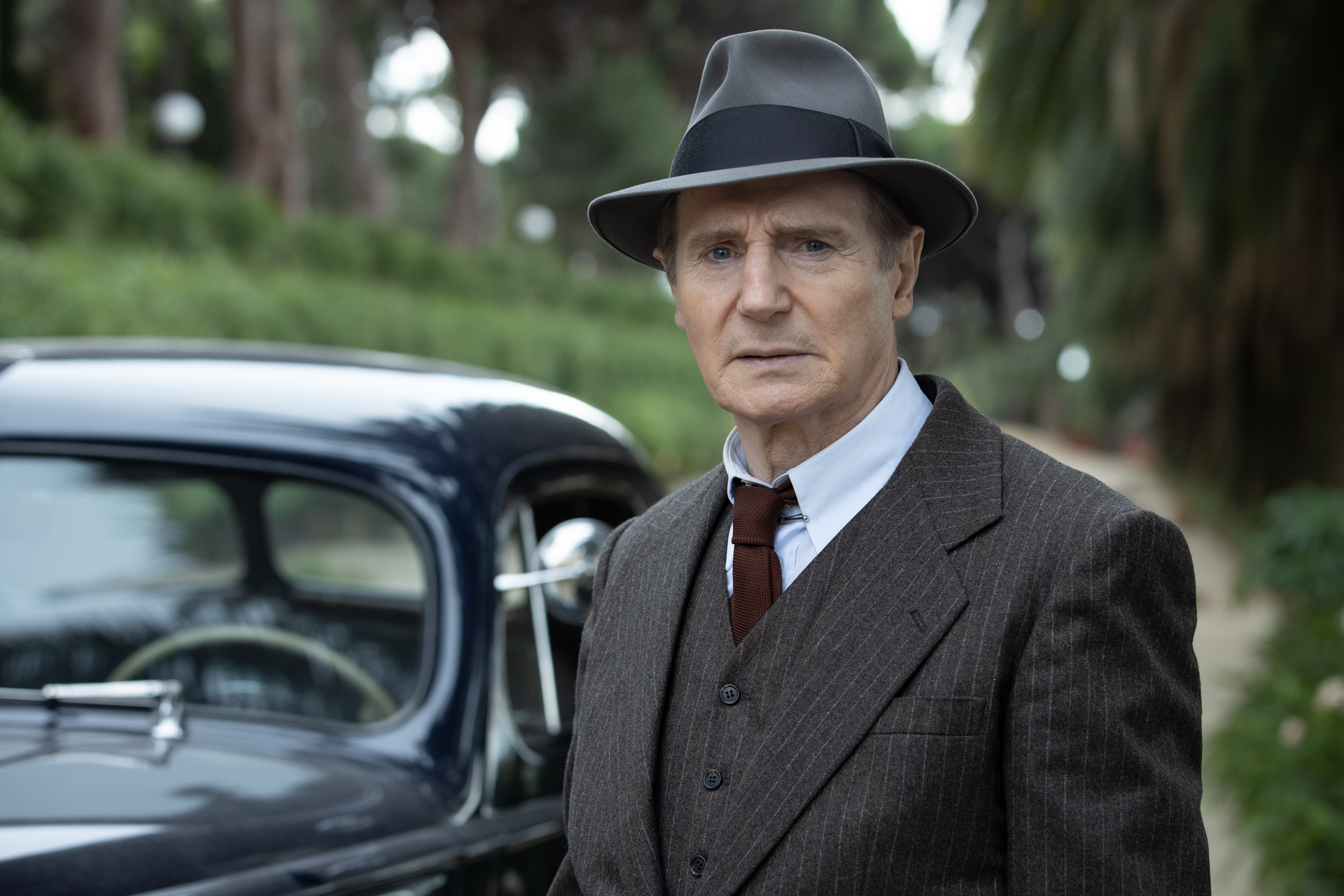Marlowe, the new film starring Liam Neeson as the classic hard-boiled detective Philip Marlowe, opens with a shot of a blonde in a red dress sitting in an office. The camera pans slowly, and as it does we see we’re viewing here from the building across the way, Venetian blinds obscuring our view. Pull back some more and we find a ruffled man smoking a cigarette looking out the window in his shadowed office, his name printed on the fogged glass door.
This lady in red turns out to be a very brief red (literally) herring, but the rest of the shot is not. In its first minute, Marlowe rapidly runs through a gamut of tropes of classic film noir, instantly telling the viewer that this film is playing noir straight — no neo-noir, neon noir, sci-fi noir, or any other spinoffs of the genre. It is, in a day and age of films deconstructing genre, an ironically innovative take, and for that, it should get some praise.

The movie is not based on any of Raymond Chandler’s original pulp novels but a 2014 Philip Marlowe story called The Black-Eyed Blonde by Benjamin Black. In it we find Marlowe (Neeson) taking on the case of femme fatale and heiress Clare Cavendale (Diane Kruger) after her lover is supposedly murdered. Pulled into a family drama that includes her mother Dorothy (Jessica Lange), crime boss Lou Hendricks (Alan Cumming), and a private club owner named Danny Huston (Floyd Hanson), Marlowe finds himself uncovering a mystery that dives into the seedy underbelly of 1930s Hollywood.
Or, at least, that’s what the film thinks it does. In execution, Marlowe is a bit too muddled in review to really function as a good mystery or a good noir. There are a few factors impacting this, but probably the biggest one is the film’s structure and unfortunate pacing. Scenes often cut away, jumping both in location and plot, leaving the viewer to piece together where they are and what is happening. Not holding the viewer’s hand in a twisty mystery is great, but director Neil Jordan doesn’t just let go of our hand — he walks away, speeds up, turns a corner, and won’t slow down. Characters, plot points, and even action sequences pop in and out like editing vomit. A true crime film will let you solve things along with the detective, but Marlowe fumbles this so badly that at one point near the end, a character narrates something that happened off-screen to explain the entire film’s plot.

The screenplay may also be part of the problem but in an oddly good way. Marlowe not only looks like those classic noir films of old, but it “reads” like one as well. The dialogue isn’t afraid to be fast, smart, complex, and witty. It’s as if someone found an old screenplay from the heyday of noir and made a movie. It is truly a breath of fresh air to watch a film whose writing is this whip-smart, though, at times, it can feel like it’s being a bit too clever. Still, Marlowe’s interrogations crackle with blink-and-you’ll-miss-it repertoire that is sorely missing from modern films. Sadly, as mentioned, the direction can’t live up to it, meaning the crackling screenplay turns into a wordy muddle instead of a clever, seedy mystery.
It’s also unclear just who this Philip Marlowe is as a character. It’s possible the book the film is based on tries to put a bit more humanity into the character and that’s what is going on in the film, but it makes him feel more soft-boiled than hard. Neeson’s performance never seems rough-edged. Though he handles the snappy dialogue well, he seems to be playing Marlowe with as much interest as he’s played his last 20 Taken spinoff “elder action man” roles. The film is evidently his 100th movie, and his performance makes one think he wishes he’d stopped around 80.

Putting a bit more effort into their roles is the supporting cast, especially since they get the juiciest bits to play with while Neeson is often stuck with exposition and questions. Kruger and Lange are fantastic playing off each other but never get enough time to do it, while both Cumming and Hanson chew up scenery like half of it isn’t in the shadows. Adewale Akinnuoye-Agbaje also shows up in a supporting role that feels so forced it’s hard to think of him as anything more than the stereotypical token minority assistant, a nod to classic film that could have been left in the past.
Though visually and verbally impressive, Marlowe is in review too much of a mess to deliver on its noir film ambitions. The refreshingly un-refreshing style of the film can’t save what are some simply poor directing and editing choices. It’s too bad because, with an engaged Neeson and better direction, this could have become quite the fun franchise. Instead, the film is much like any man who crosses a femme fatale: dead on arrival.






Published: Feb 14, 2023 02:41 pm